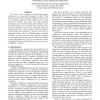Free Online Productivity Tools
i2Speak
i2Symbol
i2OCR
iTex2Img
iWeb2Print
iWeb2Shot
i2Type
iPdf2Split
iPdf2Merge
i2Bopomofo
i2Arabic
i2Style
i2Image
i2PDF
iLatex2Rtf
Sci2ools
77
Voted
ISQED
2003
IEEE
2003
IEEE
Compact Dictionaries for Fault Diagnosis in BIST
We present a new technique for generating compact dictionaries for cause-effect diagnosis in BIST. This approach relies on the use of three compact dictionaries: (i) D1, containing compacted LFSR signatures for a small number of patterns and faults with high detection probability, (ii) an interval-based pass/fail dictionary D2 for the BIST patterns and for faults with relatively lower detection probability, and (iii) D3, containing compacted LFSR signatures for clean-up ATPG vectors and randomresistant faults. We show that D2, which is two orders of magnitude smaller than a maximal-resolution pass/fail dictionary, provides nearly the same diagnostic resolution as an uncompacted dictionary. We also show that by using a 16-bit LFSR signature for D1 and D2, we obtain three orders of magnitude reduction in dictionary size, yet nearly no loss in diagnostic resolution.
Compact Dictionaries | Compacted Lfsr Signatures | Hardware | ISQED 2003 | Pass/fail Dictionary D2 |
| Added | 04 Jul 2010 |
| Updated | 04 Jul 2010 |
| Type | Conference |
| Year | 2003 |
| Where | ISQED |
| Authors | Chunsheng Liu, Krishnendu Chakrabarty |
Comments (0)

